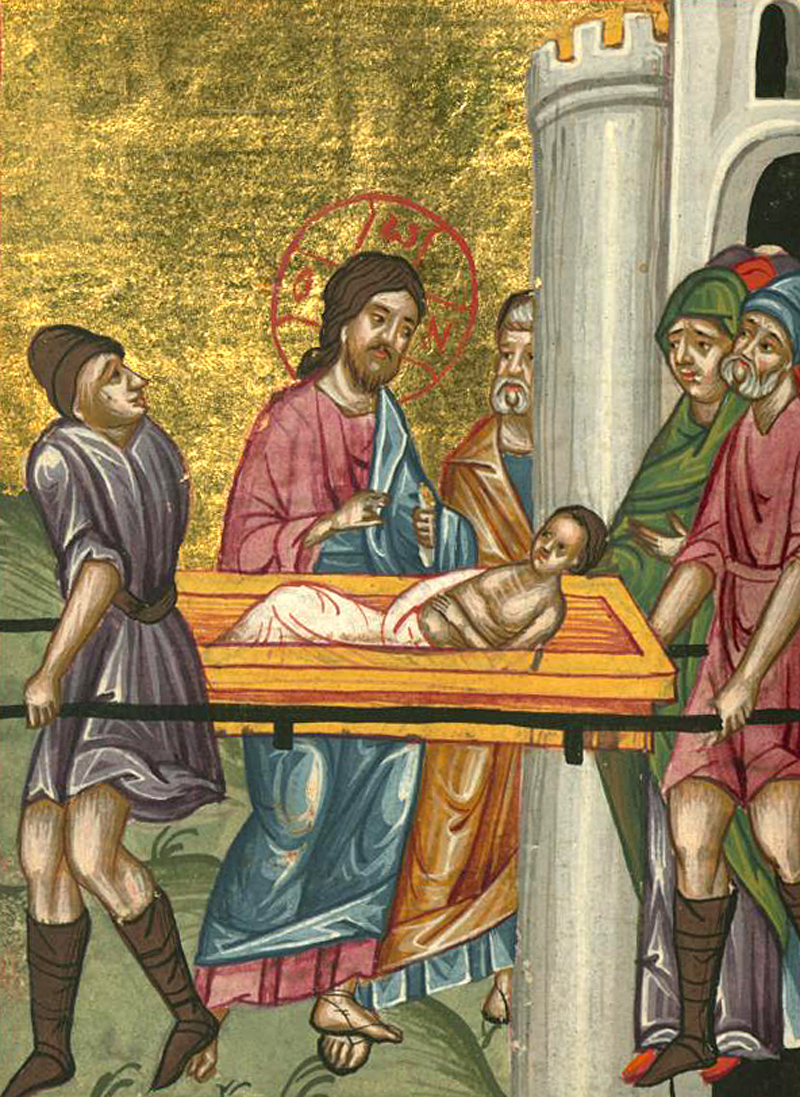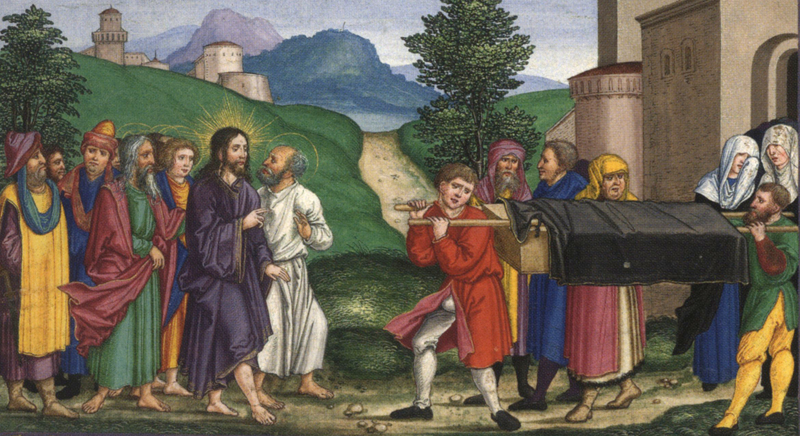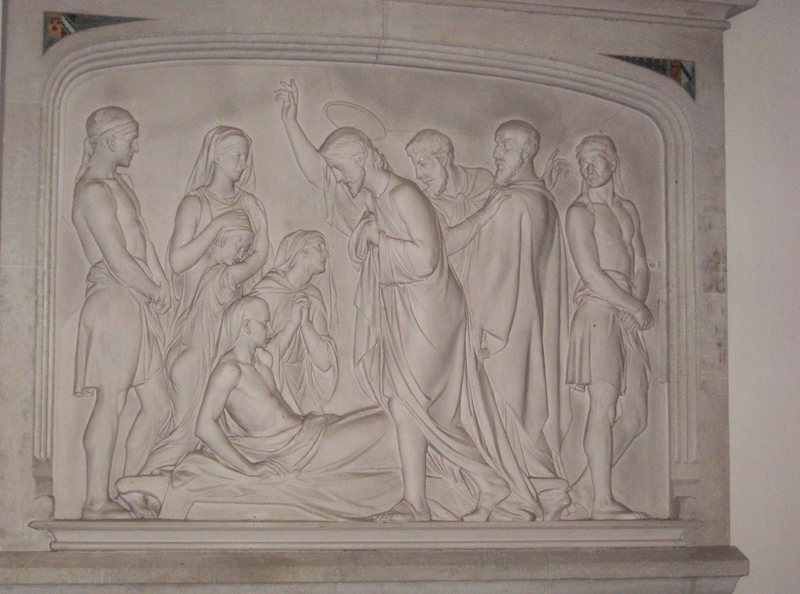Scripture: Luke 7:12-13
“When the Lord saw her, he had compassion for her and said her, ‘Do not weep’… And he said ‘Young man, I say to you rise!’”
– Luke 7:12-13
Let’s talk about death. I know, I know it is not a subject that any of us are particularly comfortable with: whether it is memories of loved ones who have died, the horrific scenes of death plastered across our news screens every day or even the prospect of our own deaths – the subject of death is not one that most of us are comfortable talking about.
And yet as American musician Steve Earle once said, playing off of a famous quotation from Benjamin Franklin, “They say death and taxes are the only things that are inevitable. The truth is, you can, not pay your taxes. I’ve done it, and there’s consequences, but it can be done. Death you’re not going to get out of, and you kind of got to deal with it.”
Death is a part of our lived experience on earth, we cannot get away from it as much as we might try to push it from our thoughts. No matter who you are, no matter how good you are, no matter how successful or healthy you are – death comes for us all. And yet in spite of this reality our culture has increasingly decided to ignore death, to downplay the significance of death. This begins with the language we use: euphemisms for death such as ‘passed away’ or ‘no longer with us’ are used rather than facing the stark reality of the word ‘death’ head on. This is even more apparent in funerals in the way that we mark the death of those who are close to us. The overwhelming trend of our time is to move away from funerals to the more festive ‘celebration of life’ where as theologian Charles Bird writes “rather than a focus upon the loss of a loved one, this service rewinds the present into the past, to draw the mourners back into the life lived by the deceased. Whereas a traditional funeral is structured around a liturgy, in this ceremony stories about the person—serious or lighthearted—take center stage.” When we ignore death, when we seek to find comfort in words and stories alone, we also inadvertently devalue life and the role that death plays in disrupting life. Disruption and grief are still there, they are just hidden under a cheerful veneer.

Our passage from the Gospel of Luke this morning, speaks to way that death disrupts life, to the way that death cannot be merely ignored and covered over. In our passage today, we heard the story of Jesus encountering a mourning mother as he entered the town of Nain in the region of Galilee. The woman Jesus met that day was a woman accustomed to death: not only was she mourning the death of her only son, but she is described as a widow having lost her husband previously. Dealing with the death of a child and spouse is hard enough in our day and age, but for this woman with the death of her son she had now lost her entire social and economic safety net. In 1st Century Palestine women were supported both socially and economically by the men in their family – if their husband died it was the responsibility of her living sons to support and provide a social identity in the community. So with the loss of her son, this woman has essentially lost her life – she would have no economic means, she would have no status within the community, in a way she has been reduced to nothing. Death has completely disrupted her life, death has in effect destroyed her life, it has stopped her from enjoying the fruits of life.
While each of us may have experienced the effects of the death of a loved one differently, this story speaks more deeply into the ways in which we experience the corruption of death as a result of Sin. Scripturally speaking, death is the result of Sin, and it is Sin which ultimately disrupts life, which destroys life and hinders us from enjoying the fullness of life in the presence of God. Humanity’s disobedience, humanity’s insistence on being Lord of our own life, relying no upon God but ourselves brings death into the midst of life, brings corruption which hinders the abundant, eternal life that God offers to all of his children.
Like the widow of Nain each of our lives are disrupted and at the risk of being destroyed by the power of death brought about by Sin. Like the widow of Nain we are confronted by the sheer totality of the effect of Sin and death on the lives we live, here and now. No matter how good we think we are, no matter how kind we might be, each of us has experienced the effect of Sin in our lives, each of us has experienced moments in our life apart from God. Each of us has experienced broken relationships with friends and family, each of us has hurt someone else for our own benefit, each of us has witnessed the systemic effects of sin in our culture and around the world – children abused, women and children savaged in war, the neglect and discrimination against the First Nations people of Canada, and the list goes on and on. All of these are the result of sin, all of these are signs that point to power of death in our lives, a power we ignore when we do not address death head on.

“When the Lord saw her, he had compassion for her and said her, ‘Do not weep’… And he said ‘Young man, I say to you rise!’” – Luke 7:12-13
Thankfully for the widow the story doesn’t end with Jesus walking by her on to his next destination. Instead Jesus witnesses the devastation that death has wrought in the woman’s life and as our scripture says, he had compassion for her and said ‘Do not weep’. Not because weeping is inappropriate, not because Jesus wants her to celebrate the life of her son, but because Jesus knows full well what death brings, he knows full well that death disrupts life, he knows full well the impact the son’s death has on the woman. He told the woman not to weep, because he had come to bring life, he had come to defeat the power of death in the world, to bring life into the situations of brokenness and decay. Jesus told the woman not to weep, because He is the source of life, he is the very life of God incarnate in flesh breathing life into this world marked by death.
Jesus touches the funeral bier and says “Young man, I say to you rise!” and the man returns to life. Jesus even touch the man, he doesn’t pray to God to raise the man back to life, no instead he speaks and it is done. He speaks and he returns life to the young man and to his mother, he speaks and life appears where there was none before. By returning the son to life, he restored the woman to the community, he restored the woman’s financial and social security net, he overturned the disruption caused by death – and brought abundant life back to the woman and her son. In response the community was afraid and the crowd glorified God.
“When the Lord saw her, he had compassion for her and said her, ‘Do not weep’… And he said ‘Young man, I say to you rise!’” – Luke 7:12-13
Like the widow’s story, our story does not end with the destruction and disruption which is brought about by Sin and death. Like the widow, God in Jesus shows compassion on us and tells us not to weep. Unlike the widow it is not as simple as speaking a word, it is not as simple as touching the bier. To defeat the power of Sin and death over us, Jesus bears the full weight of our Sin and death on the Cross. On the Cross Jesus suffers the violently brutal result of the humanity’s Sin, as Paul writes in 2nd Corinthians “For our sake God made him to be sin who knew no sin, so that in him we might become the righteousness of God.” By dying under the full weight of Sin, Jesus liberated us from the weight of sin and death in our lives, and opened up for us a way to experience abundant life as Children of God.
In dying and rising to new life Jesus shown that death does not have the last word, that the life of God – the life that is offered to all who repent and believe in Jesus – cannot be contained by death, that the life of God cannot be held in check by weight of human sin and disobedience. While we still experience the sting of death in our lives, the promise of God is that death is not the end, that death does not eternally separate us from the love of God, that death does not hinder us from experiencing abundant life now on earth, and eternally in the presence of God. We are all invited into this promise, we are all invited to repent of our sin, repent of our disobedience, repent and return to God – recognizing our need for abundant life, recognizing our need for his grace and mercy. When we do that, our lives can be transformed here and now, we can begin to experience the fullness of life that God offers to us in Jesus. Is there someone you have hurt by your actions? Seek them out, ask for forgiveness and see if there is anything you can do to make amends. Is there someone who has hurt you by their actions? Seek them out and find a way to heal the brokenness. Do you have a relationship that has fallen apart, where there is estrangement or brokenness? Recognize the part you have played and seek reconciliation, perhaps there are small steps you can take today to grow closer.
Let us all rejoice in the life that God offers to us in Jesus, let us all turn and repent the Sin in our life, let us all recognize the effect death has on our life, and let us rejoice that while death can continue to sting it is not the final answer, that Jesus comes in our midst and brings us abundant and eternal life.
Thanks be to God! Amen

